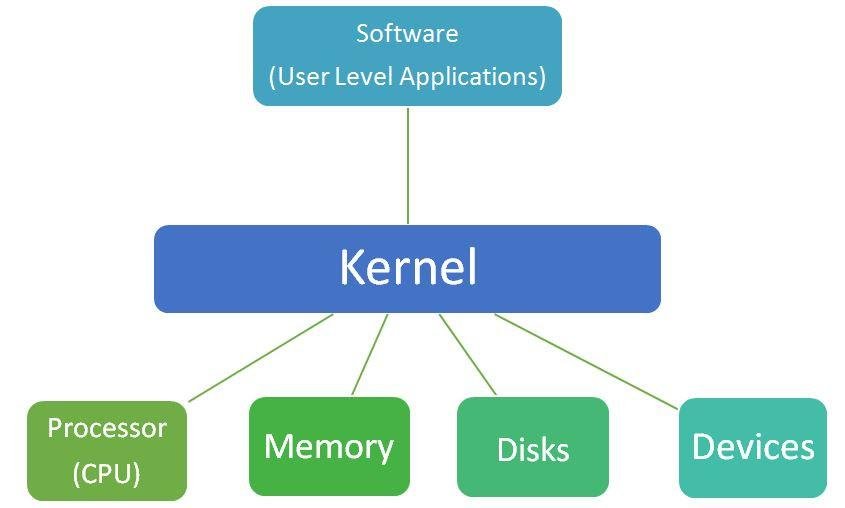The kernel is the central component of an operating system, playing a crucial role in managing hardware and software resources. It operates at the core of the system, providing essential services and ensuring smooth interaction between applications and hardware. This article explores the fundamental functions of the kernel in operating systems, highlighting its role in process management, memory management, device management, file system management, and system calls.

1. Process Management
Overview:
Process management is a critical function of the kernel, responsible for handling the execution of processes within the system. A process is an instance of a program in execution, and the kernel ensures that processes run efficiently and without interference.
Key Functions:
- Process Creation and Termination: The kernel manages the creation and termination of processes. When a program is executed, the kernel allocates resources and creates a process. Upon completion or termination, the kernel deallocates resources and removes the process from the system.
- Process Scheduling: The kernel uses scheduling algorithms to determine the order in which processes are executed. It ensures that processes are allocated CPU time fairly and efficiently, balancing between different tasks and optimizing system performance.
- Context Switching: The kernel performs context switching to switch the CPU’s attention between different processes. This involves saving the state of the current process and loading the state of the next process, allowing multiple processes to share the CPU effectively.
- Inter-Process Communication (IPC): The kernel facilitates communication between processes through mechanisms like pipes, message queues, and shared memory. IPC allows processes to exchange data and synchronize their actions.
2. Memory Management
Overview:
Memory management is another fundamental function of the kernel, responsible for managing the system’s memory resources. The kernel ensures that memory is allocated and deallocated efficiently, preventing conflicts and optimizing performance.
Key Functions:
- Memory Allocation: The kernel allocates memory to processes based on their requirements. It tracks the usage of memory and ensures that each process receives the necessary resources while avoiding fragmentation.
- Virtual Memory: The kernel implements virtual memory to provide processes with an abstraction of a larger memory space than physically available. Virtual memory allows for efficient multitasking and ensures that processes can run independently without interfering with each other.
- Paging and Swapping: The kernel uses paging to divide memory into fixed-size pages, which can be swapped in and out of physical memory as needed. Swapping involves moving entire processes between physical memory and disk storage to manage memory usage and performance.
- Memory Protection: The kernel enforces memory protection to prevent processes from accessing memory that does not belong to them. This helps maintain system stability and security by isolating processes and protecting critical system areas.
3. Device Management
Overview:
Device management is a crucial function of the kernel, responsible for managing hardware devices and providing an interface for applications to interact with them. The kernel handles communication between hardware and software components.
Key Functions:
- Device Drivers: The kernel uses device drivers to interface with hardware devices. Device drivers are software components that translate high-level commands into low-level instructions understood by the hardware. The kernel manages these drivers and ensures they operate correctly.
- I/O Operations: The kernel handles input and output (I/O) operations for devices such as disks, keyboards, and network interfaces. It provides a standardized interface for applications to perform I/O operations, abstracting the complexities of hardware interactions.
- Device Scheduling: The kernel manages access to devices by scheduling I/O operations and coordinating the use of shared resources. It ensures that devices are utilized efficiently and that multiple processes can access them without conflicts.
4. File System Management
Overview:
File system management is another essential function of the kernel, responsible for managing files and directories on storage devices. The kernel provides an interface for applications to create, read, write, and delete files.
Key Functions:
- File Operations: The kernel handles file operations such as opening, reading, writing, and closing files. It provides a set of system calls that applications use to perform these operations, ensuring consistent and reliable file access.
- Directory Management: The kernel manages directories and file organization on storage devices. It maintains the hierarchical structure of directories and ensures that files are correctly located and accessed.
- File Permissions: The kernel enforces file permissions to control access to files and directories. It manages user and group permissions, ensuring that only authorized users can access or modify files based on their permissions.
5. System Calls
Overview:
System calls are the interface between user applications and the kernel. They provide a mechanism for applications to request services from the operating system, such as process management, memory allocation, and file operations.
Key Functions:
- Service Requests: Applications use system calls to request various services from the kernel. These requests include operations like creating processes, allocating memory, and performing I/O tasks.
- Context Switching: System calls involve context switching between user space and kernel space. When a system call is made, the kernel switches to kernel mode to execute the requested service and then returns to user mode to continue the application’s execution.
- Error Handling: The kernel handles errors and exceptions related to system calls. It provides feedback to applications if a system call fails or encounters issues, allowing applications to respond appropriately.
Conclusion
The kernel is a fundamental component of an operating system, responsible for managing system resources and providing essential services to applications. Its functions, including process management, memory management, device management, file system management, and system calls, are crucial for ensuring the smooth operation and efficiency of the system. Understanding these functions provides insight into the complex workings of operating systems and the critical role of the kernel in managing and optimizing computer systems.

